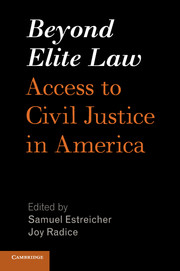Book contents
- Frontmatter
- Contents
- Beyond Elite Law
- Foreword
- List of Contributors
- Overview
- Overview
- PART I CURRENT STATE OF ACCESS TO LEGAL SERVICES
- PART II SOURCES OF LEGAL SERVICES ASSISTANCE FOR WORKING AMERICANS
- 10 Evolution of Legal Services in the United States: From the War on Poverty to Civil Gideon and Beyond
- 11 The Effect of Contingent Fees and Statutory Fee-Shifting
- 12 The Market for Recent Law Graduates
- 13 Clinical Legal Education and Access to Justice: Conflicts, Interests, and Evolution
- 14 Loan Repayment Assistance and Access to Justice
- 15 Federally Funded Civil Legal Services
- 16 New York's Lawyer Referral Services
- 17 Growth of Large Law Firm Pro Bono Programs
- 18 Institutionalizing Pro Bono
- 19 Pro Bono as a Second Career
- 20 Employer-Provided Legal Services for Employment Claims
- 21 Company-Provided Legal Services
- 22 Individualized Justice in Class and Collective Actions
- PART III FASHIONING A REFORM AGENDA
- PART IV CREATING A CULTURE OF SERVICE
- Index
22 - Individualized Justice in Class and Collective Actions
from PART II - SOURCES OF LEGAL SERVICES ASSISTANCE FOR WORKING AMERICANS
Published online by Cambridge University Press: 05 May 2016
- Frontmatter
- Contents
- Beyond Elite Law
- Foreword
- List of Contributors
- Overview
- Overview
- PART I CURRENT STATE OF ACCESS TO LEGAL SERVICES
- PART II SOURCES OF LEGAL SERVICES ASSISTANCE FOR WORKING AMERICANS
- 10 Evolution of Legal Services in the United States: From the War on Poverty to Civil Gideon and Beyond
- 11 The Effect of Contingent Fees and Statutory Fee-Shifting
- 12 The Market for Recent Law Graduates
- 13 Clinical Legal Education and Access to Justice: Conflicts, Interests, and Evolution
- 14 Loan Repayment Assistance and Access to Justice
- 15 Federally Funded Civil Legal Services
- 16 New York's Lawyer Referral Services
- 17 Growth of Large Law Firm Pro Bono Programs
- 18 Institutionalizing Pro Bono
- 19 Pro Bono as a Second Career
- 20 Employer-Provided Legal Services for Employment Claims
- 21 Company-Provided Legal Services
- 22 Individualized Justice in Class and Collective Actions
- PART III FASHIONING A REFORM AGENDA
- PART IV CREATING A CULTURE OF SERVICE
- Index
Summary
Class action lawsuits are procedural mechanisms that allow the aggregation of legal claims. They provide an important means by which Americans of modest means can obtain lawyers to take on a group of related legal claims in instances where individual recovery is often too small or risky to support litigation. In this chapter, the authors discuss how individual plaintiffs can actively participate and retain their voice in the class action mechanism.
Class actions are, for all practical purposes, the only means of relief where a single plaintiff's claim is too small to support individual litigation and “private attorney generals” are needed to diffuse the costs and risks among the affected members of the class. But little is written about the individual, justice-seeking plaintiff within the class. Is her voice heard amid the clamor of the advocates, among the throngs in the class? Can individuals realize justice in today's class action? Our experience is yes – if certain precautions are taken to both ensure and incentivize active participation, as well as remedy individual harms within the parameters of class relief.
PROTECTING INDIVIDUAL VOICES
At first, the notion of prioritizing individual voices seems fundamentally antithetical to class actions. Class actions allow a court to treat a group of individuals as one unit based on their common nucleus of facts, being subjected to uniform policy of the defendant, and presuppose that a single judgment can provide relief for each member of the class. Such uniform treatment into one action promotes judicial economy and avoids duplicative waste of resources, as well as the potential of unfair disparate outcomes. But “due to the efficiency-fairness dialectic in class actions,” a natural tension results between the collective and the individual in the class action framework.
This tension, however, is not insoluble: “Numerous instances will arise where authorizing a class action will actually serve as a catalyst to the attainment of individualist goals and the furtherance of individualist values.” This is particularly true if one views class actions as an “an aggregation of individuals, a complex joinder device” rather than a collection of individuals forming one entity. In the successful litigation of class actions, individual voices are critically important in the following ways.
- Type
- Chapter
- Information
- Beyond Elite LawAccess to Civil Justice in America, pp. 326 - 340Publisher: Cambridge University PressPrint publication year: 2016



